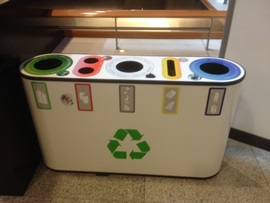 |
In 2001, ACRR has concluded a Partnership Agreement with six European Federations of plastics industry to improve the collection and recycling of targeted types of plastic waste in Europe. The agreement lasted 18 months starting from January 2002. |
THE AGREEMENT
The Partnership Agreement aimed at:
- Project 1: Work out a concept and develop communications tools for improving the awareness and communications on recycling plastics waste and promoting sound plastics recycling activities in Europe;
- Project 2: Develop pilot communications campaigns in two cities members of ACRR in order to increase locally the collection and recycling of targeted types of plastic waste;
- Project 3: Organise pilot collection schemes for such types of plastics waste in these two cities.
THE PROJECTS
Project 1 consisted of two phases:
- Phase one (months 1 to 6) aimed at defining an overall communications strategy to promote collection of targeted types of plastics waste and use of recycled products in Europe. ACRR identified funding opportunities for the development of the communications campaigns;
- Phase two (months 7 to 18) consisted in developing communications tools (possibly touring exhibition, catalogues of recycled products, guidelines for actions etc.) to improve the collection of selected types of plastics waste and to promote the use of recycled plastics in Europe.
Project 2 aimed at developing and carrying out communications campaigns in two cities selected among the members of ACRR, assessing the results and elaborating guidelines for future possible actions
Project 3 developed a common project aimed at increasing the recycling of selected plastics waste streams in one or two cities chosen among the members of ACRR, with the following steps:
- Identification of suitable streams for eco-efficient recycling based on existing Best Practices as recognised by the plastics industry and related recycling organisations, and whereby the adoption of Best Practices could lead to a significant improvement of the existing recycling performance.
- Preliminary analysis of the results currently being achieved.
- Involvement of local plastics and recycling organisations, together with municipal authorities, to develop a specific implementation plan with targets and timing.?The development of the recycling of the selected streams will include the organisation of pilot collection schemes.
Projects 2 and 3 were carried out in parallel with phase two of Project 1.
THE ACTIVITIES
Development of a communication strategy
The development of a communication strategy includes the identification of best practices, the analysis of public and private communication campaign, one of the weak points identified in the plastic recycling loop is the collection.
Four main sectors generating plastic waste, which can be managed by the local authorities, were identified:
- the households,
- the agricultural sector,
- the trade and the small (and medium) enterprises (SME) sector,
- the construction and demolition (C&D) sector.
Each sector, besides its particular socio-economic characteristics, has a specific plastic waste pattern: C&D is the principal generator of PVC waste with a long life cycle, agriculture generates films, with soil and agrochemical contamination, and drums also contaminated by agrochemicals, the trade and SME sector generates films and crates, households generate a mix of packaging waste…
For those sectors, examples of private and public collection scheme have been identified focusing on the collection scheme and on its communication and financing.
Different waste plans and management strategies from public authorities were gathered in order to analyse which were the references and the recommendations concerning plastic waste.
In the framework of this partnership, two pilot projects were developed.
- The first pilot project was proposed by the Junta de Residus from Catalonia in Spain. The objective of this project is to separate and quantify the different fractions of the waste stream generated in six construction works and in three demolition works, with a special emphasis on the plastic waste.
- The second project was proposed by LIPOR in the region of Porto in Portugal. The objectives of the project of LIPOR were to develop its personalized (Eco-phone) selective collection scheme for the SME’s and to establish pilot collection scheme for waste from the construction and demolition sector. Both collection schemes had a special emphasis on the plastic waste collection.
PARTNERS INVOLVED
Partners involved
- ACRR
- The European Council of Vinyl Manufacturers (ECVM)
- The European Plastics Converters (EuPC)
- The European Stabilisers Producers Association
- The European Council for Plasticisers and Intermediates (ECPI),
- The Association of Plastics Manufacturers in Europe (APME)
- The European Plastics Recyclers (EuPR)



